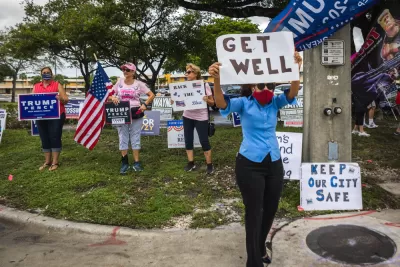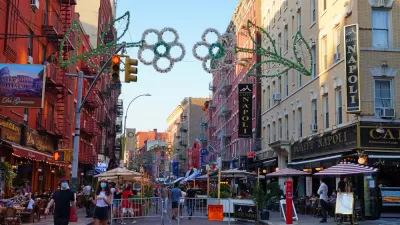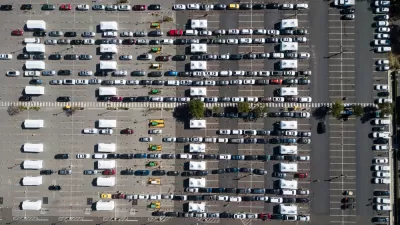The conversation about how the pandemic might alter the direction of planning and urbanism, unlike the spread of the coronavirus, has remained steady since March.

[Updated October 14, 2020] The coronavirus has been running rampant now for long enough for speculation to benefit from information, as the final group of articles listed in the below compendium attests. The disruption of the first days of the pandemic have given away to patterns, and these patterns are now lingering, rather than emerging. Unemployment is still at record lows. An eviction crisis looms, with the day of reckoning a constant source of anxiety and political negotiation; transit ridership cratered at the beginning of the pandemic, making a small, incremental recovery since then; and vehicle miles traveled by automobile are still well below pre-pandemic levels. Americans have been generally staying home for months, now with an extra layer of environmental threat represented by wildfire and hurricane season, and are increasingly turning to parks and active transportation for escape from the doldrums of the pandemic lifestyle.
Individuals who have flouted the public health guidance of experts and scientists have paid a price (yes, I'm talking about the Trump administration, among others), and parts of the country that thought that they were immune are now seeing the highest rates of infection per capita (a fact that has worsened as the most recent weeks have passed). Increasing infections didn't stop a resident from attempting to make a citizen arrest of the entire Board of Supervisors in Shasta County, California. The FBI uncovered a plot to kidnap the governor of Michigan. The country has been living with this heavy blanket of anxiety and anger for months now, but every day seems to reveal some novel form of risk and conflict, even as patterns of mobility and the real estate market have settled.
Meanwhile, infection rates for the entire country are creeping up again. Infection rates in my home county of Los Angeles are creeping up again. Infection rates in the Northeast, where Americans lived through the worst of the pandemic six months ago, are creeping up again. Way too many people are sick, and everyone is tired.
Planetizen has been documenting the ongoing debate about the future of urbanism, planning, transportation, etc., throughout the pandemic, so far sharing five previous compendiums of articles on the subject, with many more examples mixed in over the course of the year.
- The Media Can't Stop Talking About the End of Cities (August 2020)
- The Great Debate: Will the Pandemic Alter the Course of Urbanism? (July 2020)
- Debating the Future of Cities After the Coronavirus, Volume 3 (June 2020)
- Density Debate Rages Alongside the Pandemic (April 2020)
- Debating the Future of Cities, and Urban Density, After the Pandemic (March 2020)
- Coronavirus and Urbanism (Planetizen Tag)
- Coronavirus and Transportation (Planetizen Tag)
- Coronavirus and Density (Planetizen Tag)
I didn't do any official count to compare, but my impression is that now many in the field of planning and its allied professions have begun to make sense of the realities of the pandemic, and are ready to have an informed discussion about the world that will be created when the pandemic is finally defeated. That doesn't mean that the wild speculation about the potential demise of cities has ended. I'm sure we'll be having that conversation for long after the coronavirus meets its match.
Status Check
- Zillow 2020 Urban-Suburban Market Report (Zillow, August 12)
- Urban Density and Covid-19 (Centre for Economic Performance, August 2020)
- How the pandemic is magnifying structural problems in America's housing market (CityMetric, September 2)
- Public transportation is getting crushed by the coronavirus. Will it come back? (The Washington Post, September 3)
- What Rent Drop? Listed Prices Aren’t Budging Where COVID-19 Hit Hardest (The City, September 10)
- Covid-19 is now a rural and red state pandemic (CityObservatory, September 16)
- Millions Are House-Rich but Cash-Poor. Wall Street Landlords Are Ready. (The Wall Street Journal, September 18)
- ‘Tsunami’ of hotel closures is coming, experts warn (Los Angeles, September 19)
- Ban cars: Why cities are embracing the call for car-free streets (City Monitor, September 21)
- VMT Stabilized in July; Gas Production Indicates This May Be “New Normal” Level (Eno Center for Transportation, September 24)
- Apartment List National Rent Report (Apartment List, September 29)
- Booming house prices spell more trouble for the social contract (The Economist, October 3)
- Street Food: Cities Turn Parking Spaces Into Dining Spots And No One Seems To Mind (NPR, October 5)
- Coronavirus Has Thrown Around 100 Million People Into Extreme Poverty, World Bank Estimates (The Wall Street Journal, October 7)
- Trump Just Doomed Independent Music Venues (Vice, October 7)
Urban Exodus of Urban Revival?
- Get Ready for the Great Urban Comeback (The Atlantic, September 2, 2020)
- Your children are no safer in the suburbs: Fewer people die because of the city’s mass transit (New York Daily News, September 2)
- "We Have A World To Win": New Yorkers On Not Leaving NYC (Gothamist, September 8)
- Will big cities bounce back, or fade away? (The Boston Globe, September 8)
- If Seattle is dying, here’s the cause of death (Crosscut, September 8)
- Moving to the burbs is suddenly back in style: City dwellers with coronavirus cabin fever lead the way (The Oregonian, September 9)
- In New Development, Buyers Favor the Boroughs (The New York Times, September 11)
- A midwestern revival is on its way (The News Record, September 12)
- Six months into the pandemic, downtown Chicago is a humbled giant. Can it get back on its feet? (Chicago Tribune, September 12)
- Jerry Brown on a California Exodus: ‘Tell Me: Where Are You Going to Go?’ (The New York Times, September 14)
- What We Actually Know About How Americans Are Moving During Covid (Bloomberg CityLab, September 16)
- A Survey of New York City’s High-Income Earners: The Future of Work and the Quality of Life (Manhattan Institute, September 16)
- City Beat: No flight to Portland’s suburbs (CityObservatory, September 17)
- The Big Covid-19 Suburban Head-Fake (The American Conservative, September 28)
- Cities are too resilient to be killed by Covid (The Irish Times, September 29)
- Yes, people are leaving San Francisco. After decades of growth, is the city on the decline? (San Francisco Chronicle, October 9)
- ‘Worst in the state’: S.F. sales tax data show likely population decline (San Francisco Chronicle, October 9)
Planning for the Future
- Beyond Complete Streets: Could COVID-19 Help Transform Thoroughfares Into Places for People? (Planetizen, September 7)
- 'Place-Healing': From Adaptation to Manifesto (Planetizen, September 8)
- Building Public Places for a Covid World (The New York Times, September 14)
- 7 investment priorities for a green COVID-19 recovery: report (Smart Cities Dive, September 14)
- Neighborhood Revival: A Pandemic Perspective (Strong Towns, September 19)
- Legacy Cities in a Post-COVID World: View From Experts in the Field (Economic Innovation Group, September 22, 2020)
- Philly City Council wants to keep expanded outdoor dining options through 2021 (WHYY/PlanPhilly, September 24)
- Outdoor Dining Is Now a Permanent NYC Fixture, Mayor Announces (Eater New York, September 25)
- The Murky Case for Mass Telecommuting (Bloomberg CityLab, September 25)
- Covid-19 Is Not The ‘Death Of The City’ - It’s The Rise Of The Neighborhood Center (Forbes, October 1, 2020)
- Building more roads won't help fix America's economy (CNN, October 2)
- Urban planning experts share 3 characteristics of an ideal neighborhood to live in during a pandemic (Insider, October 2)
- As U.S. Transportation Infrastructure Holds Back Economic Recovery, It's Time for Change (Planetizen, October 7)
- How Oakland Got Real About Equitable Urban Planning (We Are Not Divided, October 8)
- When vision meets COVID-19 (Winnipeg Free Press, October 10)

Planetizen Federal Action Tracker
A weekly monitor of how Trump’s orders and actions are impacting planners and planning in America.

Congressman Proposes Bill to Rename DC Metro “Trump Train”
The Make Autorail Great Again Act would withhold federal funding to the system until the Washington Metropolitan Area Transit Authority (WMATA), rebrands as the Washington Metropolitan Authority for Greater Access (WMAGA).

DARTSpace Platform Streamlines Dallas TOD Application Process
The Dallas transit agency hopes a shorter permitting timeline will boost transit-oriented development around rail stations.

Renters Now Outnumber Homeowners in Over 200 US Suburbs
High housing costs in city centers and the new-found flexibility offered by remote work are pushing more renters to suburban areas.

The Tiny, Adorable $7,000 Car Turning Japan Onto EVs
The single seat Mibot charges from a regular plug as quickly as an iPad, and is about half the price of an average EV.

Supreme Court Ruling in Pipeline Case Guts Federal Environmental Law
The decision limits the scope of a federal law that mandates extensive environmental impact reviews of energy, infrastructure, and transportation projects.
Urban Design for Planners 1: Software Tools
This six-course series explores essential urban design concepts using open source software and equips planners with the tools they need to participate fully in the urban design process.
Planning for Universal Design
Learn the tools for implementing Universal Design in planning regulations.
Municipality of Princeton
Roanoke Valley-Alleghany Regional Commission
City of Mt Shasta
City of Camden Redevelopment Agency
City of Astoria
Transportation Research & Education Center (TREC) at Portland State University
US High Speed Rail Association
City of Camden Redevelopment Agency
Municipality of Princeton (NJ)






























